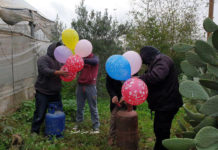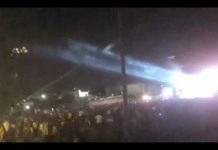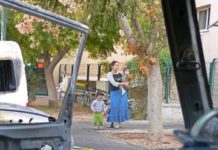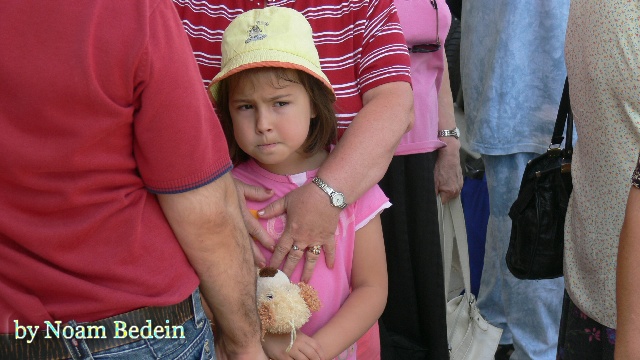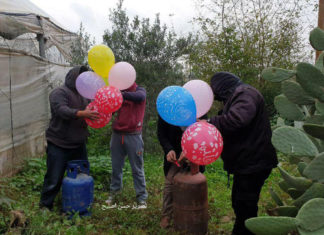Higher rate of miscarriages in Sderot linked to rocket stress, new study finds.
In the field of journalism, there are people you encounter who leave an imprint on your yellow notepad even years after you’ve met them. Sometimes you find that you can’t immediately write their particular story – as important as it may be – as other articles and deadlines surface and the story is shelved in the back files of your mind. But there comes a moment when you suddenly have that opportunity to share.
Living in Sderot during the year of heavy rocket fire leading up to Operation Cast Lead in 2008, I reported on a distressing reality in a time when very little media attention was being given to the situation. At the scene of rocket attacks, I would often meet the victims – children and elderly, mothers and fathers – usually at their homes or neighborhood grocery stores and playgrounds where a rocket had just struck. I would write and remember everything that was said to me and mentally photograph those scenes of rocket terror. The panic and fear that laced the voices of people who stood in shock among the broken glass and collapsed roofs of their homes, with the ugly gaping holes left by the rockets, and the trauma that followed – all this I tried to convey in the articles I wrote.
BUT THERE was one victim whose story, which was really a sentence, I never got around to writing. I still remember the scene. It was the summer of 2007 and I had just started working at Sderot Media Center. Following the Color Red siren and the explosion that ensued, the director, Noam Bedein, and I raced to the apartment building that had been hit by a rocket fired from northern Gaza.
This was all fairly new to me and the situation had a very surreal quality, almost like a movie shot in slow-motion. We would rush to the scene, film, photograph and delicately approach the residents to see if they would be willing to talk. After this one particular attack, ironically, a resident of the apartment building, a woman, probably in her early 30s, began conversing with me. She told me that it was very difficult living with the constant rocket hits and that she had recently suffered a miscarriage because of the stress.
The Sderot woman had two children with her. When she spoke of her miscarriage, it caught me off guard. It was such a personal revelation, and it made me realize that there were probably many women like her in Sderot, whose lives had been shattered by an incoming rocket.
I was 21 at the time, a student at university, but that Sderot mother’s story stayed with me. The fact that a rocket fired from Gaza could take away the life of an unborn child a few kilometers away in Israel was a tragedy beyond words.
Recently, researchers from Ben-Gurion University shared a very important study, linking the rocket attacks from Gaza to an increased number of miscarriages in Sderot from 2004 to 2008. The study, which was published in the Psychosomatic Medicine Journal of Bio-behavioral Medicine, found “statistically significant correlations” between exposure to life-threatening rocket attacks in Sderot and spontaneous abortions (more commonly known as miscarriages) and prenatal maternal stress.
The authors explain in the study that the Israeli southern town of Sderot had been the constant target of rocket fire from the Gaza Strip since 2001. Between April 2001 and December 2008, more than 1,000 rocket alarms were sounded in or near Sderot, with 500 of them during 2008 alone. Out of the 1,132 Sderot women who took part in the study, only seven had never experienced a siren during a six-month period before and during pregnancy.
The researchers, Tamar Wainstock and Prof. Ilana Shoham-Vardi of the epidemiology department of BGU’s Faculty of Health Sciences, and their colleagues, Dr. Liat Lerner-Geva and Saralee Glasser, both of the Gertner Institute at Tel Hashomer, and Dr. Eyal Anteby of the Barzilai Medical Center in Ashkelon, compared two groups of women, from Sderot and Kiryat Gat, with similar health characteristics.
Kiryat Gat was chosen as the control city for several reasons. The city’s socioeconomic and demographic features were very similar to Sderot and pregnant women from both cities took part in the study at Ashkelon’s Barzilai Medical Center, which serves both populations. It is also important to note that during the period chosen to record the women, Kiryat Gat was still out of rocket range, although since then the city has been the target of rocket attacks from Gaza as well.
The final study population included records of 3,488 pregnancies of 2937 women, 1,132 from Sderot and 1,805 from Kiryat Gat. It was found that women in Sderot exposed to the stress of alarms or actual rocket fire had higher rates of miscarriage than women in Kiryat Gat who did not suffer from that kind of stress (6.9% verses 4.7%). The perceived stress level among Sderot women was also higher, with the exposed group scoring 4.36 on the stress questionnaire and the unexposed group 3.05.
“The findings demonstrate a significantly increased risk of SA among women exposed to potentially life-threatening situations for a prolonged period, both before and during pregnancy, compared with women of similar demographic characteristics who were not exposed to missile-attack alarms or missile attacks,” the authors wrote.
The researchers theorized that one possible reason for miscarriages was an increase in cortisol due to stress, and suggested it was important to assess the level of stress among women in the very early stages of pregnancy, and in couples trying to conceive. The authors also recommended policy planning to reduce the negative effects of stress on reproductive health.
The study, whose results were presented at a prenatal and pediatric epidemiology conference in Montreal two years ago, shed important light on an aspect of life that Israelis living under rocket fire have been coping with for years. Such research can only lead to more awareness about life in Israel’s south and the lasting impact that rocket terror has on Israel’s civilian population.
The writer spent two years living in Sderot, where she experienced constant rocket attacks on the city working as an international media liaison and front line reporter between 2007 and 2009. She now works as a writer and educator at Hebrew University High School.
Article source:http://www.jpost.com/Opinion/Columnists/Article.aspx?id=306576



